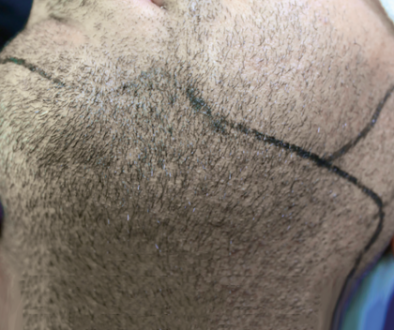Why Does My Hair Transplant Surgeon Recommend Propecia (Finasteride) and Rogaine (Minoxidil)?
I’m 28 years old and about 2 years ago I lost all my hair around my temples and minor recession on the front right side of my head. It looks as though this is the extent of my balding (assumption as father and grandfather only lost temple hair). I’m just wondering which surgical procedure would best benefit my scenario of covering up my temples and the very slight recession on the front right of my head?
The closest “known” surgeon in my area is Dr. Thomas Nakatsui, I booked an appointment today….but it’s a 3 month wait. In addition, I did consult my family physician and he gave me finasteride (1/4 tablet a day). I tried it for about a month and I had to stop right away as I experienced symptoms of the drug and was told by my doctor to completely stop as it could lead to life long problems later on.
Therefore, I feel since I have only lost temple hair and minor recession I feel surgery is the best way to go instead of wasting money in the long run spent on Rogaine…etc.
 It can be difficult in younger patients like you to predict just how far hair loss will progress. Looking at family history on both sides may offer some insights but there are no guarantees. The older the patient, the more accurately we can predict the final extent of that person’s balding.
It can be difficult in younger patients like you to predict just how far hair loss will progress. Looking at family history on both sides may offer some insights but there are no guarantees. The older the patient, the more accurately we can predict the final extent of that person’s balding.
Conventional wisdom tells us that hair loss is progressive for most men and, since there is no hair loss cure, most hair restoration physicians recommend that hair transplant patients also medically stabilize their hair loss with Propecia (finasteride) and Rogaine (minoxidil).
I understand the need to stop finasteride. I took it for a few years and then quit for a number of reasons. However, we need to understand that doing so likely commits us to further hair loss and the potential for subsequent hair transplant surgeries to address this. You’ll want to discuss this with your surgeon because it should be factored in to the long-term hair restoration plan.
Along with the commitment to medical hair loss treatments, other factors that need to be considered when formulating this plan are:
- The patient’s hair restoration goals.
- The patient’s potential future Norwood Scale classification.
- Quality and quantity of available donor hair.
The benefits of Rogaine are often debated. But, in my opinion, the cost of generic minoxidil foam is so low that I feel it’s cheap insurance.
All this to say that there are few certainties when it comes to future hair loss but clinically proven drugs add an extra layer of insurance over the long term.
—-
David
Editorial Assistant and Forum Co-Moderator for the Hair Transplant Network, the Coalition Hair Loss Learning Center, and the Hair Loss Q & A Blog.
To share ideas with other hair loss sufferers visit the hair loss forum and social community.
Technorati Tags: balding, hair loss, hair loss cure, hair restoration, hair transplant, Propecia, finasteride, Rogaine, minoxidil, hair loss treatments, Norwood Scale



